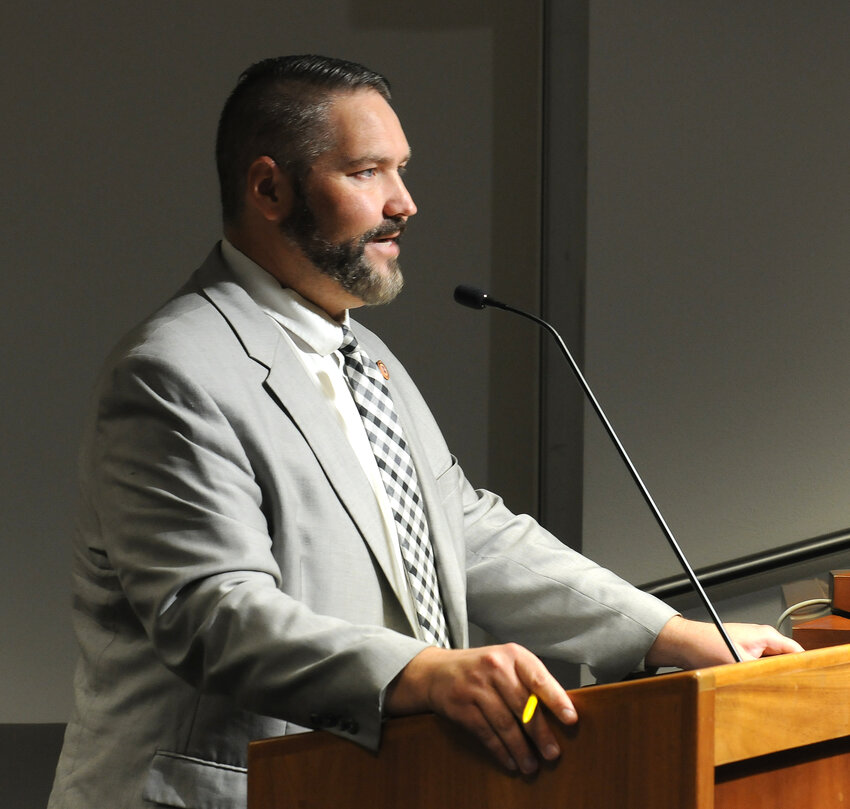Mesa lawmaker pushes for Arizona to conduct its own census - Daily Independent
PHOENIX – Rep. Justin Heap, R-Mesa, is promoting a ballot referral that would allow Arizona to run its own census in 2030 and each 10 years thereafter that would include a tally of U.S. … Rep. Justin Heap, a Republican from Mesa, is pushing for Arizona to run its own census in 2030 and each 10 years thereafter, which would include U.S. citizens only. The proposal would be used to redraw state legislative districts without using a skewed system that counts everyone. This comes as an issue in Arizona's elections due to the ongoing border crisis and a surge of migrants crossing the border. Critics argue that using only citizen counts could cement a Republican majority in the Legislature for decades. The Arizona Free Enterprise Club, a conservative group that lobbies for low taxes and small government, has supported Heap's proposal. However, Sen. Priya Sundareshan, D-Tucson, expressed concerns about the potential cost and potential impact on federal funding.

Published : a month ago by BOB CHRISTIE | CAPITOL MEDIA SERVICES in Politics
PHOENIX – Rep. Justin Heap, R-Mesa, is promoting a ballot referral that would allow Arizona to run its own census in 2030 and each 10 years thereafter that would include a tally of U.S. citizens only.
Heap’s proposal would be used to redraw state legislative districts to ensure that legislative districts are drawn without using what he called a skewed system that counts everyone instead of just people who are citizens and potentially eligible to vote.
With a surge of migrants crossing the border in recent years, Heap said ensuring that only citizens are used to divvy up legislative seats is even more important. Congressional seats would continue to be apportioned by federal census data because of controlling federal law.
Immigration has been an issue in Arizona's elections for years but is becoming an even more potent weapon in the battle between Republicans and Democrats this year because of the border crisis.
Putting it on the ballot as a proposed state law could be seen as a win for GOP strategists as they look to draw voters to their cause.
Democrats, by contrast, are focusing on qualifying a ballot initiative ensuring the right to abortion in the state, an issue equally as important for getting their voters, moderates and many women to the polls.
Democrats inside and outside the Legislature see Heap's effort as dangerous on multiple fronts, including spreading fear in immigrant communities if state census counters fan out in their neighborhoods trying to count them.
That could cause them not to respond to official U.S. Census questionnaires, limit Arizona's representation in Congress and have major impacts to federal funding in the state. The cost is another factor, according to opponents.
But their biggest fear is that using only citizen counts to draw legislative districts could essentially cement a Republican majority in the Legislature for decades.
Democrats have been chipping away at the GOP majority for years as minorities who tend to back their party move to the state. And Republicans now only have a one-seat majority in each chamber.
Eliminating any non-citizens from the count used to draw legislative districts would very likely lead to more Republican-majority districts.
Heap’s proposal sailed through the House with little debate and passed with only votes from majority Republicans.
But Sen. Priya Sundareshan, D-Tucson, said that’s going to end when the measure comes up this coming week in the Senate Appropriations Committee after languishing for weeks without advancing in the upper chamber.
"We in the Senate Democratic Caucus have significant concerns about this and what it may be, what it’s intended to do and the costs and the fear that it’s going to create,” Sundareshan said.
Heap’s proposal is optional, because it gives the Legislature the ability to forgo it because of costs or any other reason and just default to the federal census.
In an interview with Capitol Media Services, Heap noted the state-run census would ensure that the state's 30 legislative districts are apportioned only with citizens, leaving out any immigrants, whether legally in the U.S. or not.
"It becomes a problem that citizenship is not going to be a standard for how we apportion out who's going to vote,'' he said.
"That's going to throw off Arizona districts,'' Heap said. "It’s going to concentrate districts that have large numbers of non-citizens living in it are going to be over-represented in the legislature where districts that have fewer people but more citizens are going to get less. So that is a substantial problem.''
The Arizona Free Enterprise Club, a conservative group that lobbies for low taxes and small government, lobbied Heap to bring the measure, although its president, Scot Mussi, said he did not know if Heap introduced the bill because of that. Heap declined to say.
Mussi echoed Heap’s concerns about an inaccurate 2020 Census and said not counting non-citizens is the second reason for his group’s support.
And the first?
"I think it's no secret that in 2020, during the last census, the U.S. Census Bureau bungled it,'' Mussi said.
"Simultaneously, looking at this and opportunities to conduct your own census is also this issue of whether or not non-U.S. citizens should be counted,'' he said. "So if the state is going to conduct its own census, it probably should be done in a way that only counts U.S. citizens.''
We’d like to invite our readers to submit their civil comments on this issue. Email [email protected].
Topics: Census
